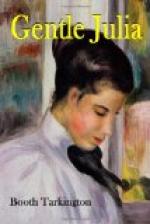“He certainly will!” Mrs. Atwater declared. “Noble’s mother told me last week that he’d got so he was just as liable to drop a fountain-pen in his coffee as a lump of sugar; and when any one speaks to him he either doesn’t know it, or else jumps. When he says anything, himself, she says they can scarcely ever make out what he’s talking about. He was trying enough before Julia went away; but since she’s been gone Mrs. Dill says he’s like nothing in her experience. She says he doesn’t inherit it; Mr. Dill wasn’t anything like this about her.”
Mr. Atwater smiled faintly. “Mrs. Dill wasn’t anything like Julia.”
“No,” said his wife. “She was quite a sensible girl. I’d hate to be in her place now, though, when she tells Noble about this.”
“How can Mrs. Dill tell him, since she doesn’t know it herself?”
“Well—perhaps she ought to know it, so that she could tell him. Somebody ought to tell him, and it ought to be done with the greatest tact. It ought to be broken to him with the most delicate care and sympathy, or the consequences——”
“Nobody could foretell the consequences,” her husband interrupted:—“no matter how tactfully it’s broken to Noble.”
“No,” she said, “I suppose that’s true. I think the poor thing’s likely to lose his reason unless it is done tactfully, though.”
“Do you think we really ought to tell Mrs. Dill, Mollie? I mean, seriously: Do you?”
For some moments she considered his question, then replied, “No. It’s possible we’d be following a Christian course in doing it; but still we’re rather bound not to speak of it outside the family, and when it does get outside the family I think we’d better not be the ones responsible—especially since it might easily be traced to us. I think it’s usually better to keep out of things when there’s any doubt.”
“Yes,” he said, meditating. “I never knew any harm to come of people’s sticking to their own affairs.”
But as he and his wife became silent for a time, musing in the firelight, their daughter’s special convictions were far from coinciding with theirs, although she, likewise, was silent—a singularity they should have observed. So far were they from a true comprehension of her, they were unaware that she had more than a casual, young-cousinly interest in Julia Atwater’s engagement and in those possible consequences to Noble Dill just sketched with some intentional exaggeration. They did not even notice her expression when Mr. Atwater snapped on the light, in order to read; and she went quietly out of the library and up the stairs to her own room.
* * * * *




